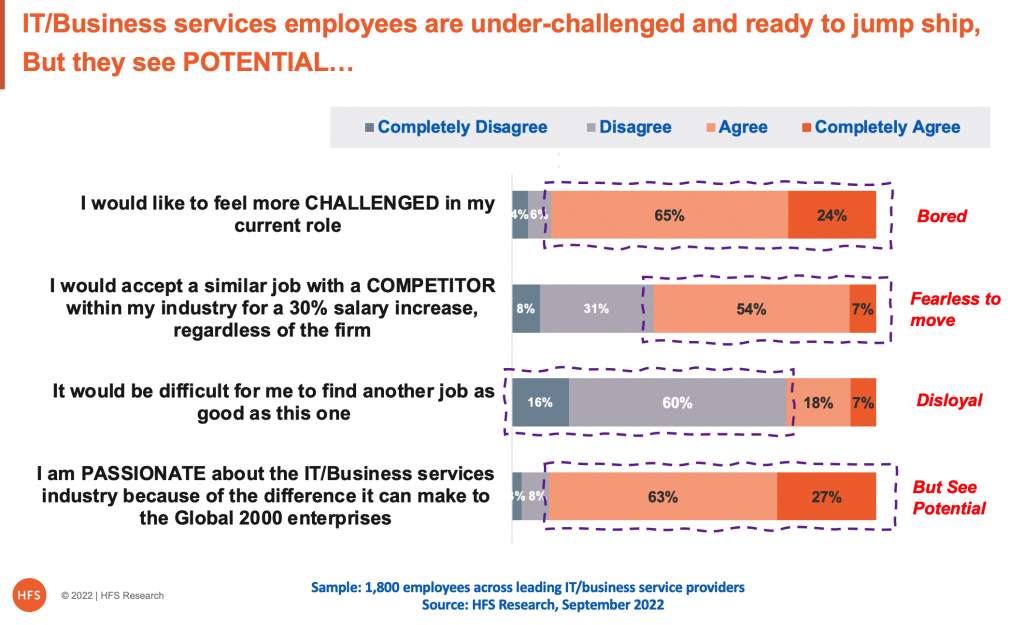
Our new IT/business services talent study, covering the experiences of 1800 services staff across major regions and the leading 16 service providers, reveals why attrition has been running at the 30% level (and that is only what is officially reported) and showing few signs of slowing, despite a worsening economy and the threat of recession.
As you can see, close to 9 out of 10 staff want to feel more challenged (and are bored), 61% will jump to a competitor for a pay hike, and 75% believe they can easily find a job as good as the one they currently have. The only saving grace for the IT and Business services industry is that 90% of employees are passionate about the impact they can have on enterprise clients.
There is salvation, folks, and it holds real potential if service provider leaders can get their heads out of the sand and challenge both their clients and their staff to raise the value of their partnerships.
This industry is at a pivot point, and winning the talent war is the only way to survive
Simply put, there aren’t enough skilled workers out there to deliver billions of dollars of services, and most of these service providers still have a prehistoric mindset of routine work being cranked out in cube farms by zombie staff willing to work for low wages. Well, those days are pretty much over, and those service providers that fail to become more attractive places to work, with challenging work to deliver, will quickly fall away in the emerging environment, which will not be for the faint-hearted. If they can’t keep their workers and have them deliver more value to their clients, they will end up in a zero-sum race to the bottom and likely lose business because their clients will not tolerate the attrition and the impact on delivery quality.
The problem with the services industry is that when companies provide outsourced services for enterprise customers, it’s most often the monotonous tasks the customer can offload at scale, such as application testing, infrastructure monitoring, accounts payables or receivables.
Even sexier-sounding work, such as content moderation for social media sites or product support services is usually very tedious after a while, especially when the services worker is just instructed to follow a standard operating procedure without any incentives to use judgment, creativity, analytical skill, or common sense. It’s no wonder staff are quitting in droves in search of something more challenging when there is so much demand for workers to perform elsewhere. Now that next job may turn out no more challenging than their current gig, but if there’s 30% more money for doing it, why not?
Service provider leaders must stop blaming entitled staff and become better employers
Now we can moan and groan about the attitude and self-entitlement of some Gen-Zs and Millennials who have no loyalty, don’t care about longevity on their CVs, etc., but put yourself in their position: you’re ambitious, and other companies are offering you more challenging work, more money, and are simply more exciting places to work. Why would you want to suffer a life of soul-crushing work for a company that still operates the same way it did 15-20 years ago? And can you blame staff for preferring to work from home than suffer from the monotony of a stuffy cube kingdom where most of the management isn’t even there? Let’s be blunt: it’s often the management who have become self-entitled, not the staff. The problem ultimately lies with bad leadership, not bad working attitudes.
The Bottom-line: The services industry has a huge opportunity to increase its value to enterprises, but its leadership must radically change old habits
Our new research shows that enterprise clients are willing to pay for more than just routine work delivered, with two-thirds declaring they would shift to an outcomes-based model. So why aren’t they? It’s simply a two-way proposition: service providers need to demonstrate they have the capability to take on higher-value work, and they need to convince and demonstrate to their clients that they have the workforce and leadership skills to do just that.
Quite simply, the conversation regarding what constitutes value needs to change – enterprises need to be convinced to pay for value than mere effort… is it really that hard? Seems to me that many service providers lack the leadership talent to have that conversation… and need to address that asap.
When 90% of services workers are passionate about IT/business services and are clearly wanting to take on more challenging and interesting work, we have a huge opportunity. When service providers have multi-year agreements to get down and dirty with the institutional processes of a client, isn’t this a wonderful opportunity to upsell them new work, new ideas, and new ways to excite their staff? When the trust is already there, what is stopping IT and business services from moving up the value chain and helping enterprise customers desperately need more support from smart talent who understands their challenges?
This is a leadership challenge to recognize where the industry will fade away and make big changes to take their firms in a new direction. We’re already operating in a cut-throat global environment where the very stability of our economies, businesses, and livelihoods are under an unprecedented assault. We can either rise up to these challenges and find new sources of value or struggle to stay afloat as the mayhem subsumes us.
Posted in : Business Process Outsourcing (BPO), Buyers' Sourcing Best Practices, Customer Experience, Employee Experience, IT Outsourcing / IT Services, Talent and Workforce






